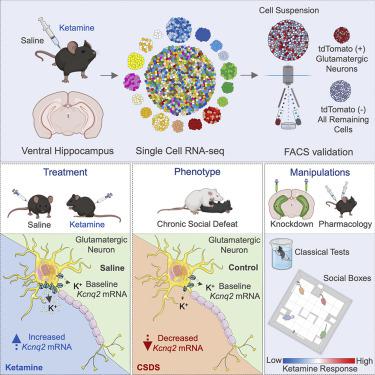Neuron ( IF 14.7 ) Pub Date : 2022-05-31 , DOI: 10.1016/j.neuron.2022.05.001 Juan Pablo Lopez 1 , Malte D Lücken 2 , Elena Brivio 1 , Stoyo Karamihalev 1 , Aron Kos 1 , Carlo De Donno 3 , Asaf Benjamin 4 , Huanqing Yang 1 , Alec L W Dick 1 , Rainer Stoffel 1 , Cornelia Flachskamm 1 , Andrea Ressle 1 , Simone Roeh 5 , Rosa-Eva Huettl 1 , Andrea Parl 1 , Carola Eggert 1 , Bozidar Novak 6 , Yu Yan 6 , Karin Yeoh 6 , Maria Holzapfel 1 , Barbara Hauger 1 , Daniela Harbich 1 , Bianca Schmid 1 , Rossella Di Giaimo 7 , Christoph W Turck 6 , Mathias V Schmidt 1 , Jan M Deussing 1 , Matthias Eder 1 , Julien Dine 8 , Fabian J Theis 2 , Alon Chen 9

|
A single sub-anesthetic dose of ketamine produces a rapid and sustained antidepressant response, yet the molecular mechanisms responsible for this remain unclear. Here, we identified cell-type-specific transcriptional signatures associated with a sustained ketamine response in mice. Most interestingly, we identified the Kcnq2 gene as an important downstream regulator of ketamine action in glutamatergic neurons of the ventral hippocampus. We validated these findings through a series of complementary molecular, electrophysiological, cellular, pharmacological, behavioral, and functional experiments. We demonstrated that adjunctive treatment with retigabine, a KCNQ activator, augments ketamine’s antidepressant-like effects in mice. Intriguingly, these effects are ketamine specific, as they do not modulate a response to classical antidepressants, such as escitalopram. These findings significantly advance our understanding of the mechanisms underlying the sustained antidepressant effects of ketamine, with important clinical implications.
中文翻译:

氯胺酮通过细胞类型特异性调节 Kcnq2 发挥其持续的抗抑郁作用
单次亚麻醉剂量的氯胺酮会产生快速和持续的抗抑郁反应,但造成这种情况的分子机制仍不清楚。在这里,我们确定了与小鼠持续氯胺酮反应相关的细胞类型特异性转录特征。最有趣的是,我们确定了Kcnq2基因作为腹侧海马谷氨酸能神经元中氯胺酮作用的重要下游调节因子。我们通过一系列互补的分子、电生理、细胞、药理学、行为和功能实验验证了这些发现。我们证明了瑞替加滨(一种 KCNQ 激活剂)的辅助治疗可增强氯胺酮对小鼠的抗抑郁样作用。有趣的是,这些作用是氯胺酮特异性的,因为它们不会调节对经典抗抑郁药(如依他普仑)的反应。这些发现显着促进了我们对氯胺酮持续抗抑郁作用机制的理解,具有重要的临床意义。











































 京公网安备 11010802027423号
京公网安备 11010802027423号